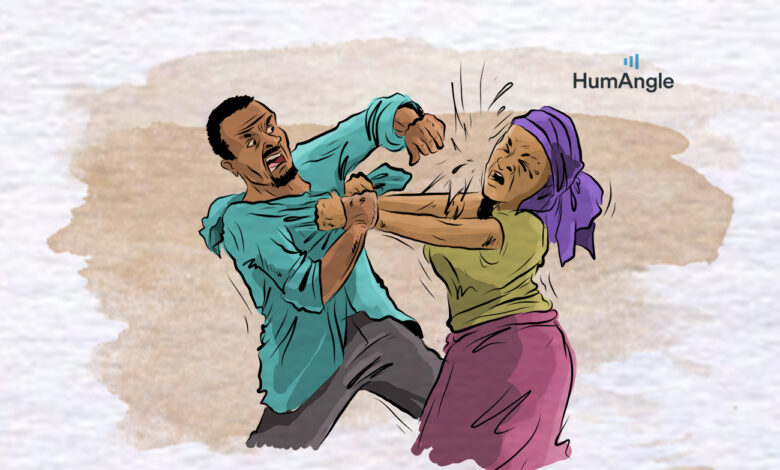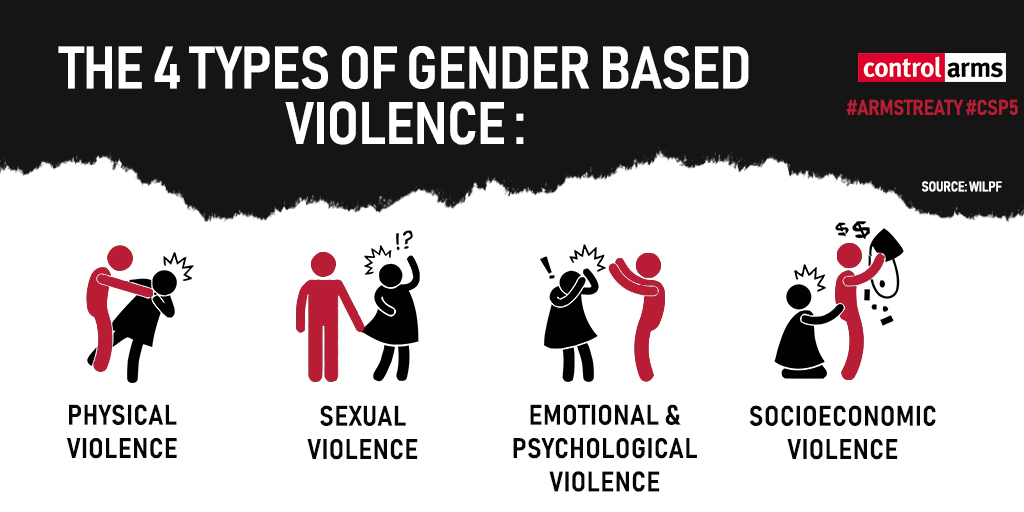Nigeria Struggling To Combat Gender-Based Violence, Despite Laws
The United Nations declared Sexual and Gender-Based Violence (SGBV) as a ‘shadow pandemic’ while calling for urgent, comprehensive, and effective actions by duty bearers to curb the menace.

Police in Lagos, Southwest Nigeria, are still unravelling the circumstances around the death of 34-year-old Busayo Adewuni, a mother of three, who is allegedly a victim of domestic violence.
Relatives said Busayo had suffered several assaults from her husband before Sunday, Feb. 7, 2022, when she allegedly died due to beating from her husband. Enoch Adewuni, her husband is already being detained and investigated by the Police while her mother-in-law is said to be on the run in relation to the cause of her death.
To ensure that she gets justice, Women Arise For Change Initiative, a Non-Governmental Organisation (NGO) promoting and championing the cause of women in Nigeria is currently on Busayo’s case.
While Busayo did not live to tell her tales, 49-year-old Ajoke in Ifo Local Government Area (LGA) of Ogun State in the same Southwest region, told HumAngle how she was assaulted by her husband’s friend in her home.
Ajoke said Hakeem Arogundade, a long-standing friend to her husband came along with his girlfriend on Jan. 29, 2022, leading to an assault which almost claimed her left eye.
“Arogundade falsely accused me of plotting to kill my husband over infidelity. While narrating the lies to my husband, I couldn’t take it so I locked his shirt, telling him he is lying,” she recounted.
“When the argument started, my husband tried to separate us and he ran out to call our neighbours, before he came back, Aro had beaten me till I bled.”
Police in Ifo, she said, arrested and locked Arogundade up, but was released following the intervention of some community leaders.
While she battles for her left eye’s survival, Ajoke revealed that the man who assaulted her still issues threats to her.
When contacted, Hakeem Arogundade said he acted in self-defence. “I have been a mediator in Ajoke’s house for a long time. I went to their house to settle an issue between her and her husband before things got out of hand. I acted in self-defence when Ajoke wanted to attack me,” he claimed.
Like Ajoke, each time a physical assault occurs, justice often remains difficult to get as survival (if alive) is always advised to settle amicably.
Despite repeated commitments by the Nigerian Government to ensure that women are safeguarded against abuses and violence, more and more Nigerian women are becoming victims of gender-based violence (GBV).
More words, little actions against GBV
In his Democracy Day speech on June 12, 2020, Nigerian leader, Muhammadu Buhari, highlighted the government’s determination to fight GBV using the law and awareness creation.
The President said it was important to go beyond just legislation in fixing the problem of GBV, but rather, interrogate the deeply dysfunctional cultures, systemic flaws in institutions, and the perverse social norms which enable sexual and gender-based violence.
Sadly, there have been more recurring cases of gender-based violence two years after the President’s speech.
Violence against women – particularly intimate partner violence and sexual violence – is a major public health problem and a violation of women’s human rights, the World Health Organisation said.
Estimates by WHO indicate that globally, about 1 in 3 (30 per cent) of women have been subjected to either physical and/or sexual intimate partner violence or non-partner sexual violence in their lifetime.
Recently, the United Nations declared Sexual and Gender-Based Violence (SGBV) as a ‘shadow pandemic’ while calling for urgent, comprehensive, and effective actions by duty-bearers to curb the menace.

SGBV by statistics
A 2021 United Nations Women report revealed that 48 per cent of Nigerian women have experienced at least one form of violence since the COVID-19 pandemic.
The UN data on reported incidents of GBV cases in Nigeria based on preliminary information from 24 states shows that in March, the total number of GBV incidents reported was 346, while in the first part of April, incident reports spiked to 794, depicting a 56 per cent increase in just two weeks of lockdown in 2020.
Moyosore Onigbanjo, Lagos State Attorney-General and Commissioner for Justice, said the state recorded 10,007 reported cases of domestic violence, including sexual abuse perpetrated against adults and children between May 2019 and Aug. 26, 2021.
The Lagos State Domestic and Sexual Violence Response Team (DSVRT), Onigbanjo said, has continued to see a steady increase of formal reportage of domestic violence cases of over 150 cases daily despite awareness campaigns.
She said 4,150 of the cases were domestic violence cases recorded within two years.
In June 2021, the Ekiti State Sexual Assault Referral Centre, also known as Moremi Clinic in 2021 recorded 139 GBV cases of gender-based violence within one year of its establishment.
“We stand with every woman and every child who suffer GBV and assure them of our confidentiality and free services without fear, favour or discrimination,” said Rita Ilevbare, Coordinator of the Centre.
Coverage of VAPP Act and discrepancies in laws
The Nigerian government enacted the Violence Against Persons (Prohibition) Act (VAPP), 2015, to protect people against various forms of violence. As of March 2021, it has been domesticated in 22 states except Adamawa, Bayelsa, Borno, Gombe, Imo, Kano, Katsina, Kebbi, Kogi, Niger, Ondo, Rivers, Sokoto, Taraba, and Zamfara.
The VAPP Act makes copious provisions on eliminating violence in private and public life; prohibits all forms of violence (physical, sexual, psychological, domestic, harmful traditional practices, discrimination against persons, etc); and provides maximum protection and remedies for victims, and punishment of offenders.
VAPP Act seeks to eliminate existing cultural beliefs that initiate and sustain the prevalence of domestic violence in Nigeria. For instance, Section 55(1) of the Penal Code (applicable in Northern Nigeria) under which the beating of a wife for the purpose of correction is deemed legal, is a good example.
Additionally, some states have their Laws, such as the Lagos State Protection Against Domestic Violence Law (2007), Lagos State Child‘s Rights Law (2017), Ebonyi State Protection Against Domestic Violence Law (2005), among many others. Asides these domestic laws, Nigeria is signatory to many international conventions, including those aimed at protecting human rights among others.
Activists express concerns
Joe Okei-Odumakin, President of Women Arise, an NGO, is worried that GBV keeps increasing in Nigeria despite all efforts to stem the tide.
Joe-Odumakin’s NGO has taken up Adewuni’s case. She said investigations were ongoing and the matter was on for prosecution. Women Arise, like many others, provides counselling, referrals, and litigation support to victims of gender-based violence when the need arises.
“We would follow up on the matter to ensure justice is served, as a deterrent.” According to her, one of the major causes of GBV is the harsh economy in Nigeria.
The menace must be tackled in many ways, Joe-Odumakin told HumAngle.
“To tackle the menace we have to look at the immediate and long term solution. In the immediate future, we have to establish a one-stop response team where early warning signs can be identified and quickly reported for immediate action,” she said.
“We also have to make the human rights desks in various Police stations more proactive for them to respond promptly to gender-based violence issues. It is important to also establish community counselling centres where a group of well-trained individuals can be engaged to attend to issues of domestic violence/gender-based violence.”
She said family courts should also be established to take GBV cases and attend to them in record time.
“Our government will also need to be more sincere in rehabilitating survivors and creating a soft landing for them to be able to get themselves together and continue a good life. As we speak there are shelters in some states of Nigeria where survivors can be rehabilitated,” she said.
Similarly, Imabong Sanusi, Executive Director of Women Trafficking and Child Labour Eradication Foundation (WOTCLEF) said breaking the culture of silence, training citizens from childhood on their rights and responsibilities, training religious and traditional leaders on GBVe and various human rights, will help tackle the menace.
Ofim Kelechi Ofim, Media and Communications Officer at TechHer, said Nigeria needs to return to a criminal justice system that does what it was set up for, meting out justice against criminals.
“Simply put, when perpetrators get away with crimes as a result of connivance with officials who should administer justice, then we have a lot more problems than we imagined,” Ofim said in an interview with HumAngle.
Support Our Journalism
There are millions of ordinary people affected by conflict in Africa whose stories are missing in the mainstream media. HumAngle is determined to tell those challenging and under-reported stories, hoping that the people impacted by these conflicts will find the safety and security they deserve.
To ensure that we continue to provide public service coverage, we have a small favour to ask you. We want you to be part of our journalistic endeavour by contributing a token to us.
Your donation will further promote a robust, free, and independent media.
Donate HereStay Closer To The Stories That Matter




